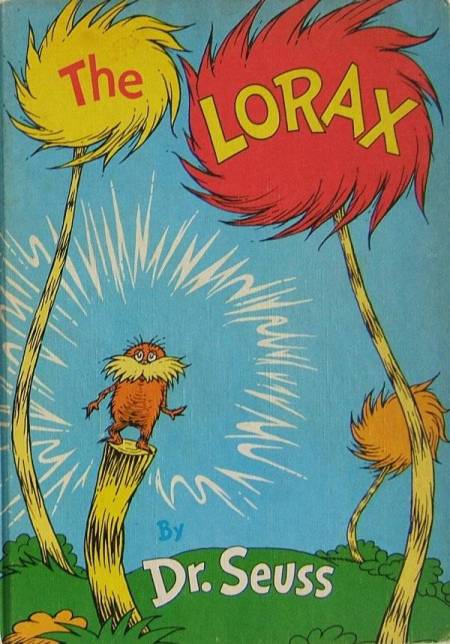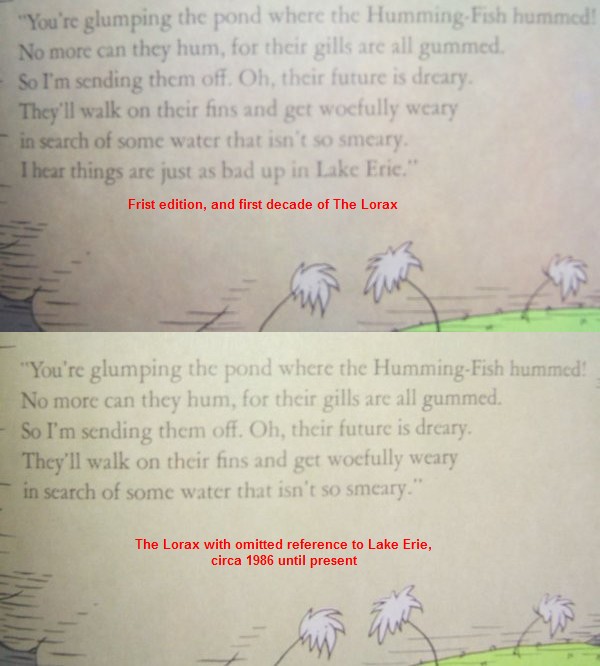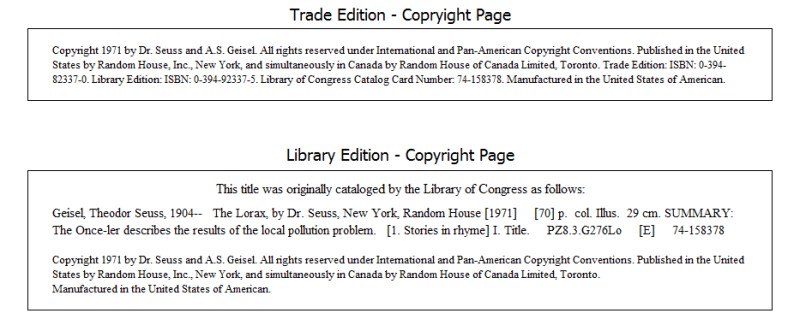Dr. Seuss First Edition Identification

The Lorax, 1971
Childrens Picturebook Price Guide: $260 Fine (updated)
“I am Lorax. I speak for the trees, for the trees that have no tongues. And I’m asking you, Sir, at the top of my lungs. Oh please do not cut down another one.”—The Lorax, Dr. Seuss, 1971
The Lorax chronicles the plight of the environment and the Lorax, who speaks for the trees against the greedy Once-ler. The book is a parable about our industrialized society. The Lorax is arguably Seuss’ most controversial work.
From the biography Dr. Seuss and Mr. Geisel (Judith & Neil Morgan):
The book startled Dr. Seuss readers, and reviewers were divided. Some called it a morality tale. Ted shrugged, saying, “It’s impossible to tell a story without a moral—either the good guys win or the bad guys win.” Others were disappointed that the book lacked his usual zaniness. Sales were slower than Random House had come to expect of a Dr. Seuss book; The Lorax was ahead of its time and its popularity began to soar only a decade later when the environmental movement exploded. Ted himself began to talk of it as his favorite book.
Although The Lorax appeared in the bookstores in the fall of 1971, news of it had reached Americans the previous spring after Ted was cornered at a brunch in San Diego by Liz Carpenter, Lady Bird Johnson’s press secretary. As they sipped Bloody Marys, Liz questioned Ted about the theme of his book. It would serve Lady Bird’s environmental concerns well, she quickly said, if he donated the book’s art and manuscript to the Lyndon B. Johnson Presidential Library in Austin, Texas, and attended its impending dedication. […]
News reports of the presidential library dedication focused on two gifts, a slice of moon rock sent by President Nixon and the original black-and-white drawings of The Lorax. President Johnson wrote Ted, “If anyone had been conducting a popularity poll in Austin the weekend of May 22, you would have won it hands down.”
The Lorax was banned in the Laytonville, California School District on grounds that this book "criminalizes the forestry industry."
When the television version of The Lorax appeared early in 1972, Newsweek called it “hard-sell ecological allegory, stabbing mainly at big business through a deceptively gentle blend of gorgeous colors, superb animation, and a rippling imagery of words and pictures.”
The Lorax is also the only book that Seuss himself ever changed after publication, by removing the Lorax’s line, “I hear things are just as bad up at Lake Erie!” From the biography Dr. Seuss and Mr. Geisel (Judith & Neil Morgan):
Two research associates from the Ohio Sean Grant Program wrote him fourteen years later about the cleanup of Lake Erie: “Improved conditions exist [in water quality]…we wonder if you would consider changing that line to past tense in future editions.”
Normally that would have involved tedious revamping of rhythm and rhyme, but this time the change involved only the final line of a four-line rhyme and he simply deleted it.

First Edition Identification:
The Lorax was issued without a dust jacket. The back of the first edition book proclaims:
Up to now,
Dr. Seuss
Has written and illustrated
32 world-famous books
For children…and their lucky parents.
Followed by two lists, the first list ending with THE LORAX. The second lists Beginner Books.
At the bottom is a yellow box with a blurb from Rudolph Flesch. The bottom right hand corner has the ISBN number “304-82337-0.”

There is a Library Edition published simulateneously with the Trade Edition, which has the same back cover text and titles list, except, oddly, the Rudolph Flesch quote is in a garish pink color. The Library Edition also has the ISBN in the bottom right corner, but it’s the wrong number. The number is “304-82337-5”, where is should be “304-92337-5.” The ‘8’ should be a ‘9.’


The copyright page of the Trade Edition and Library Edition vary dramatically. See picture, below.

Note that the Library Edition does not show the ISBN number on the copyright page. The Trade Edition includes the correct ISBN for both the Trade and Library Edition.